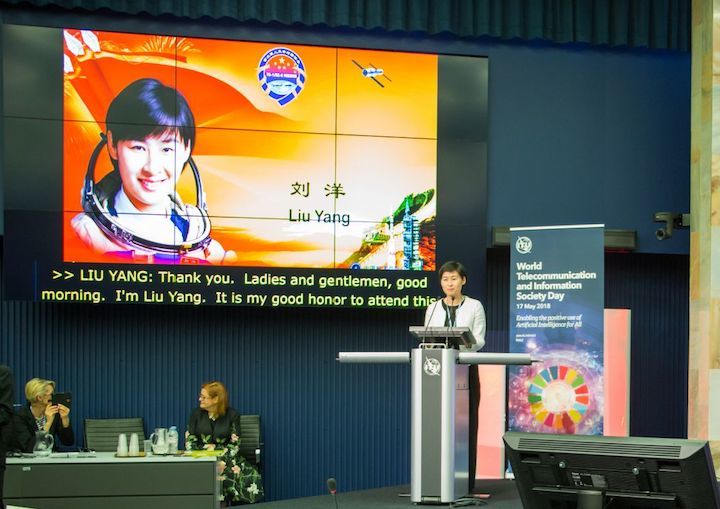Liu Yang, China's first female astronaut in space, believes artificial intelligence (AI) will be very helpful in human spaceflight missions and greatly improve exploration, she said at an event on Thursday.
Liu Yang was attending the World Telecommunication and Information Society Day (WTISD) in Geneva, along with European Space Agency (ESA) astronaut Samantha Cristoforetti and space explorer Anousheh Ansari.
The trio participated in an ‘AI-powered Moonshots’ panel discussion, and discussed the role of AI in space exploration.
“We can anticipate that AI will be very helpful in human spaceflight missions,” said Liu. “We believe exploration will be greatly improved with AI astronauts.”
She added that, "Human astronauts will never be replaced, since they are still the essence of human space flight.
The event also saw the United Nations call for an examination of the potential of AI to accelerate progress towards the UN Sustainable Development Goals (SDGs).

China's first female astronaut Liu Yang (2nd L), Italian astronaut Samantha Cristoforetti (2nd R), Space tourist Anousheh Ansari (1st L) and ITU Secretary-General Zhao Houlin attend an interactive forum in Geneva, Switzerland, May 17, 2018.
Beauty beyond words
Liu Yang became China's first woman in space in June 2012, flying aboard Shenzhou-9 to the Tiangong-1 space lab, as a stepping stone mission to a planned larger Chinese Space Station.
Liu spoke of her time in preparing for space, needing physical strength and psychological stamina to withstand space sickness experienced daily when living without gravity, and described her experiences of space.
“Though I had been prepared, I was deeply astonished,” said Ms Liu. “I could hardly describe how beautiful and miraculous [the Earth] is. The beauty of our planet is quite beyond words. I couldn’t help shouting: ‘Look the earth is round, indeed.’ … I felt like a free fish swimming in the ocean of space.”

Liu Yang in front of the charred Shenzhou-9 return capsule.
Multiplying opportunities
The women astronauts discussed the challenges they needed to overcome to break gender barriers in a male-dominated field, but also looked to the future.
“We are in a very dynamic environment right now,” said Samantha Cristoforetti, mentioning commercially available flights and reusable rockets. “It’s an exciting time where opportunities will multiply to go to space.”
Liu Yang and Sam Cristoforetti together participated in a joint sea survival training off the coast of Shandong Province, Eastern China, last August.

ESA astronaut Samantha Cristoforetti in a Chinese pressure suit during training with Chinese colleagues to practise sea survival off China’s coastal city of Yantai, on 14 August 2017.
Private space explorer Anousheh Ansari, who is also the Chair of Management, XPRIZE Foundation Board of Directors, also gave an interview on the future of AI and exponential technologies.
Quelle: gbtimes

